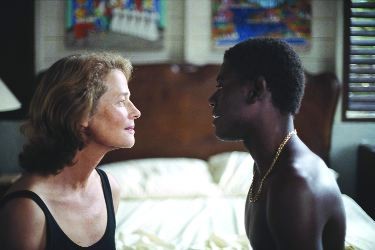Last resort

Emotionally complicated and deeply compassionate, Heading South, by the French director Laurent Cantet, approaches a delicate subject—sex tourism in Haiti in the late 1970s—with a mixture of frankness and tenderness. The frankness is in the treatment of the sexual relationships that the middle-aged women (mostly from the U.S. and Canada) form with the young men they meet on the beaches of Port-au-Prince. The tenderness is in the depiction of the two female protagonists.
Cantet and co-writer Robin Campillo don’t pass judgment on the women, who delude themselves into thinking that they’ve found romance. Ellen (Charlotte Rampling), a French teacher at Wellesley, affects a woman-of-the-world brittleness yet tries to convince her paramour, Legba (Ménothy Cesar), to go to the States with her. The naive Brenda (Karen Young), a Savannah divorcée, has returned to Haiti after three years in hopes of taking up with Legba again.
Nor do the filmmakers judge Legba, who, we realize early on, is doomed by his lifestyle and loyalties as well as by his country’s economic and political realities. Similarly constricted are the other Haitians: the headwaiter at the hotel (Lys Ambroise), who must enforce the rule that forbids the guests from entertaining their black lovers in the dining room; a destitute widow who tries to find a protector for her teenage daughter in the Port-au-Prince airport; Legba’s sometime girlfriend, a gangster’s mistress; and Eddy (Jackenson Pierre Olmo Diaz), a boy of about 12 who emulates the teenagers he hangs out with on the beach.
The movie is a tragic portrait of a culture of exploitation. It would be far too simple (not to say clichéd) to see the white women only as exploiters. Ellen and Brenda, insulated from Haitian realities—they can return home whenever they want—can’t understand the situation of the young man they adore and whose devotion they’ve competed for. But the movie never doubts the sincerity of their feelings for him.
Cantet and Campillo’s approach follows that of Tennessee Williams, who had a bottomless empathy for people who were slaves to their sexual needs and who refused to turn these figures into symbols of moral vacuity. It’s hard to watch Heading South without thinking of Blanche DuBois in A Streetcar Named Desire issuing an impassioned defense of her conduct: “The opposite [of death] is desire. So how can you wonder? How can you possibly wonder?”
Both of Cantet’s previous films distributed in the U.S., Human Resources and Time Out, dealt with issues of labor, so it’s no surprise that he takes a plangent look at the incentives and the consequences associated with Legba’s way of making money. But the central focus of the movie—the women’s psychology—is new territory for him.
There isn’t a false note among the cast, which also includes the gifted Quebecois actress Louise Portal as one of the other tourists at the hotel. Rampling and Young give superlative performances. The scene in which Ellen begs Legba to let her spirit him away to New England, her desperate longing for him conquering her reason, is her finest screen moment. And Young, with her anguish-blurred face and her splintered baby-doll voice, delivers straight to the camera a Dostoevskian, stripped-to-the-core monologue—Brenda’s account of her first sexual experience with Legba.
Cantet ends the film with Brenda: After tragedy strikes Legba, she slips away and plans journeys to other exotic resorts. She stares at the camera with a smile of erotic anticipation, and you know with appalling certainty that she’s lost.





